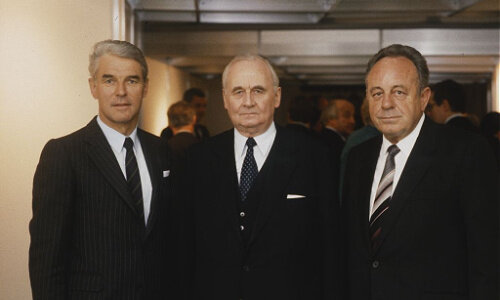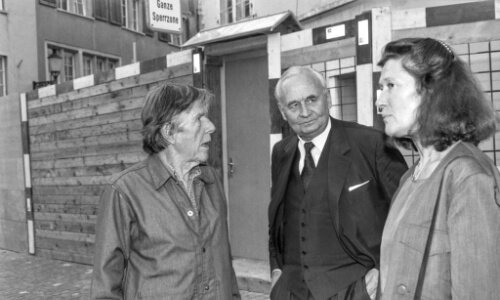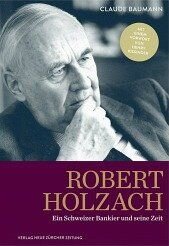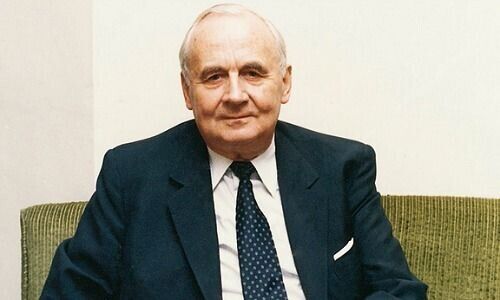A century after his birth, one of the country's most influential 20th-century bankers would have a great deal to say about the current state of the industry.
A few days have passed since Robert Holzach was born 100 years ago on the 28th of September. Although his name is rarely mentioned now, he was once a towering figure, bequeathing Swiss finance with a lasting legacy.
But in the years following his death in 2009, he is still occasionally remembered in reader letters and comments as an outstanding personality, held up as an example of competence, integrity, and performance. But most important of all, he had a deep sense of responsibility.
From Trainee to Chairman
But who was Holzach and why was he so influential? He served the former Union Bank of Switzerland (UBS) for almost fifty years, joining as a trainee in 1951 in Geneva, and subsequently climbing up every rung on the ladder to become the bank's chairman for eight years.
He was born in Zurich but grew up farther north in Kreuzlingen, near Lake Constance on the German border. He incorporates a type of banker that no longer exists but someone Swiss finance is in dire need of, according to some observers.
Deposits and Lending
For most of his career, Holzach worked in the banking industry, which was solely focused on the Swiss market, with most businesses active on deposits and lending.
It was a time when capital markets did not have the global importance that they do today. The notion of digital infrastructure – even tech – was unheard of, as was the unendingly broad selection of financial products.
No Mercy
Business relied on clearly measurable metrics. The solidity of a bank's balance sheet was linked more or less to the direct risks it took on. This meant managing directors required a wholly different sense of responsibility.
Holzach knew the country's businesses from the ground up. He had a kind of sixth sense that allowed him to separate the wheat from the chaff, helping the then UBS to inordinate success in the lending business.
Strong Instincts
His position vis-a-vis now disgraced Swiss financier Werner K. Rey is legendary. He repeatedly refused to lend him any money, saving the then UBS from the massive losses that other banks suffered after his business empire collapsed.
Holzach liked to rely on his gut instincts and had a very wide network of contacts in Switzerland and neighboring countries which is how things worked until the end of the 1980s. It was a time when wide-ranging IT infrastructure was still being implemented and Wall Street's influence was only starting to be noticeable.
Tireless Cassandra
Holzach always warned − vehemently − about the deleterious influence of machines and models, relying on common sense instead.
A Revelation
He upheld the values of honesty and loyalty and was always ready to serve. These qualities were extremely important to him and he has left his thoughts in innumerable essays and books. Rereading them is a revelation. Some of them are unforgettable and many are still cited today.
The most impressive are some from his speech in 1987 when he was talking to Harvard graduates in the US who were joining Wall Street at the time in unheard-of numbers.
«They do it in a way so that they can make millions in a matter of months without having any kind of ethical responsibility at all,» he said during a speech at UBS's 125th jubilee.
At the annual general meeting in 1988, he followed that up with: «Only bankers who understand that they are not there to enforce – but only to serve – can fully understand their entrepreneurial responsibilities.» Back then, he was indirectly saying that most bankers should not be bankers at all.
Uncontrollable

Former UBS leaders: Robert Studer, Robert Holzach and Nikolaus Senn (from left, image: ETH)
In the 1970s and 1980s, UBS was clearly the most successful financial institution in Switzerland. It also had an international reputation but none of the UBS chairmen at the time were unduly affected by its great success.
At a management conference in 1985, Holzach said: «The megalomania, the folly of out-of-control size, has always led to disaster. A dinosaur's small brain was not enough to prevent it from going extinct.»
Financial Alchemy
Holzach predicted the autumn market crash of 1987 early that year: «Brutal disillusionment awaits overly eager financial alchemists. (...) The rising number of financial scandals shouldn't surprise anyone.»
In October, shares fell more than 20 percent on the New York Stock Exchange on the now legendary «Black Monday».
Platitudes
Since then, countless top executives in finance have embraced any number of comfortable platitudes, giving themselves the illusion they have everything under control, such as the former statements made by the ex-chairman of Credit Suisse Urs Rohner. Sentences like: «We did a good job,» «The discussions about bonuses are really a philosophical question» oder «Personally, we have a clean slate».
All pure cynicism.
Strong Expansion
Holzach was not a nationalist, even though he had a close relationship with Switzerland and its military (the country continues to require mandatory national service for all males between 18 and 30 but at the time all able-bodied males served periodically in the militia for most of their working lives after completing basic training). On the contrary, under his leadership, the bank expanded to innumerable countries worldwide and kept increasing its range of services and products.
He was also the one who created the four group divisions in 1968 (commercial, finance, overseas, and services). They survived unchanged for decades, creating structures that are common in any large company today.
Holzachs style and thinking garnered him the title of «Gentleman banker», a title informally conferred on him by former Neue Zuercher Zeitung (NZZ) editor Beat Brenner in an article.
Speculation and Greed
Even if the banking industry has changed completely over the decades, one thing holds true. Bankers with access to large sources of money have to be almost spiritual about it and remain completely clean. But that is very distant from the hot-blooded speculation and greed stemming from Wall Street since the early 1990s, and something that is becoming increasingly prevalent in Switzerland.
It has also significantly worsened the perception of the industry to a wide swathe of the population.
Supporting a Number of Artists

Robert Holzach (middle) with composer John Cage (left) with an unnamed woman (Image: Keystone)
He fully understood that bankers needed to be rooted in society. He was responsible for instigating the James Joyce foundation in Zurich, funding the Max Bill sculpture on the Bahnhofstrasse, or helping to renovate the Augustiner neighborhood and building the Hotel Widder in the old town.
He personally supported a number of artists, launched two cultural foundations and organized a house of literature which continues to house writers in residence and organize lectures to this day.
End of an Era
As honorary chairman, Holzach was very much against the merger of UBS with Swiss Bank Corporation (SBC) in 1998. It was a testament to his principles and thought, although the new era of global finance had clearly passed him by.
The Americanization of Swiss banking has gained strength since the 1990s. It has prompted both major banks to destroy more value and create more scandals than provide sustainable success.
 A biography on Robert Holzach is available in German, written by finews.com founder and CEO Claude Baumann.
A biography on Robert Holzach is available in German, written by finews.com founder and CEO Claude Baumann.

































